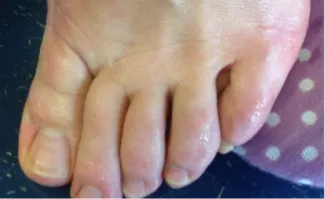Plantar Hyperhidrosis - Sweaty Feet
Overview
Plantar hyperhidrosis is characterized by intense sweating of the feet. It affects roughly 20% of the population, but only a minority experience psychosocially debilitating levels. This condition can appear isolated or associated with other types of hyperhidrosis, particularly excessive hand sweat, known as palmoplantar hyperhidrosis.

Associated Symptoms
Bromhidrosis, or unpleasant foot odor, is often linked to excessive sweating. This occurs due to the breakdown of organic substances by microorganisms in the moist environment of the skin or inside footwear.
Consequences
Excessive foot sweat leads to several issues:
- Macerated Skin: Increased vulnerability to damage and infection.
- Mycosis: Growth of fungi due to the damp environment.
- Early Wear of Shoes: Footwear deteriorates quickly, often within weeks.
- Footwear Difficulties: Challenges in wearing certain types of shoes, such as sandals.
- Psychosocial Discomfort: Impact on professional, social, and familial relationships, especially when bromhidrosis is present.
Plantar hyperhidrosis can significantly affect the quality of life, making daily activities and social interactions challenging.
Treatment
Reducing sweat gland activity alone may not be sufficient, especially if bromhidrosis is the main issue. A combination of treatments targeting both sweat reduction and disinfection is usually necessary.
Treating Plantar Bromhidrosis
- Disinfecting Foot Wash: Use disinfecting soap, like those used by surgeons.
- Alcoholic Solution Rub: After rinsing, rub your feet with an alcoholic solution containing dehumidifying components.
- Mycosis Treatment: Consult a dermatologist to treat any fungal infections.
- Disinfect Shoes and Socks: Regularly use a disinfecting spray and change socks frequently.
Treating Plantar Hyperhidrosis
- Antiperspirants: Use aluminum chloride solutions (20-25%).
- Iontophoresis: This treatment involves passing a mild electrical current through water to reduce sweating.
- Surgery: Lumbar sympathectomy may be considered for severe cases.
- Botulinum Toxin: Not recommended due to pain, cost, inconsistent results, and short duration of effectiveness.
